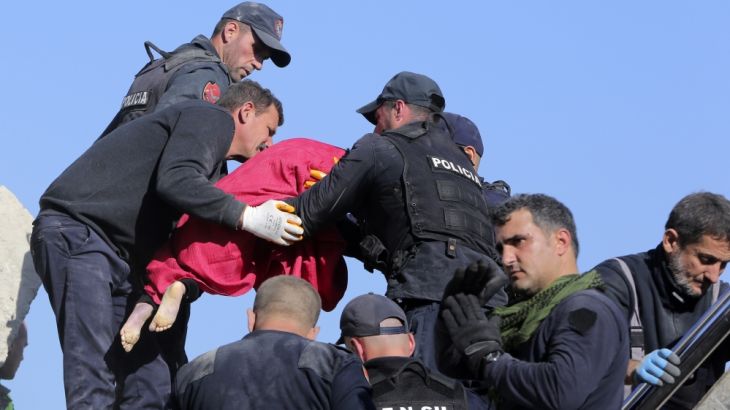Fear, evacuations and introspection in Albania after deadly quake
Death toll nears 50, with one man watching his wife, mother and children pulled from rubble.

Durres, Albania – Three days after an earthquake that killed at least 46 people, the port city of Durres is being abandoned by its residents.
Constant aftershocks to Tuesday’s earthquake, which measured 6.4 on the Richter scale, have terrified the city of 200,000 people and turned it into a ghost town.
Keep reading
list of 4 itemsHow Taiwan learned from the past to reduce the risk from earthquakes
How is Afghanistan coping six months after deadly quakes?
‘Violent rumble’: 4.8 magnitude earthquake rattles New York City, northeast
Apartment buildings near the coast were empty by Friday, some with walls missing and pillars bulging outwards.
“Half of the city has already evacuated,” opposition Democratic Party leader Lulzim Basha told Al Jazeera as he toured Durres. “People are terrorised … Hundreds have been hospitalised and hundreds of families have lost their homes.”
The government has teams of engineers inspecting buildings for safety, but the process could take weeks.
Like tens of thousands of people, seamstress Vera Kushta now spends evenings walking outside and sleeps in her car at night, avoiding her house even though it is intact. She says her neighbours have mostly left.
“People say the sea will rise up and drown Durres. Everyone is saying it,” she said.
Durres was especially hard hit because it was so close to the earthquake’s epicentre.
All the fatalities and collapses of multi-storey buildings took place in Durres and the town of Thumane to the northeast.
But even in the capital Tirana, 36 kilometres (22miles) inland, which suffered no fatalities, many were afraid to spend the night at home.
It's clear that some of these constructions were totally out of the standards of security.
The Rruga Karl Gega, a six-lane highway connecting the city centre to the eastern suburbs and a proud achievement of the socialist government of Edi Rama, is lined for kilometres with parked cars full of families bedding down under blankets.
As buses full of volunteers from neighbouring Kosovo and North Macedonia arrived at the Leonik Tomeo middle school in Durres, people thought the buses had come to evacuate them.
Police shut the school gates to prevent hundreds of panicked residents from storming on board.
The school is adjacent to the city’s football stadium, which served as a temporary shelter for residents who cannot or will not return home. The government had placed 1,000 people in hotel rooms and another 800 in makeshift shelters in the school, but many were turned away.
Panic replaced hope of finding survivors on Wednesday, when rescue teams pulled only corpses from the rubble.
Among them were a young couple found with their eight-year-old son in Thumane.
The most tragic figure of the natural disaster was perhaps Berti Lala, who watched rescue workers pull his dead wife, mother and four children from the rubble of their apartment building.
“It’s clear that some of these constructions were totally out of the standards of security,” President Ilir Meta told Al Jazeera, who said there should be an inquiry.
Most of the damage in Durres was where it might be least expected – on the Rruga Pavaresia, lined with relatively new, glitzy hotels and apartment buildings.
Some appeared to have had inadequate foundations. The three-storey Beach Hotel Vila Verde appeared to kneel into the beach it was built on as it tilted towards the sea. The four-storey Lubjana Hotel across the street was stuck in a reclining position, its two enormous Corinthian columns still holding up a verandah that was coming away from the rest of the building.
“Half of the construction in Albania is new, relatively speaking. It’s 15, 20, maximum 25 years,” said Basha. “So a lot of it has been criticised for the poor quality of construction… A lot of introspection is to be done, at a societal level and a legal level.”
Such concerns were still far from the mind of pensioner Afrodita Bregu, who received no help from the army or the municipality.
“Our own first and second floor have been destroyed. I don’t want charity. I don’t want food or clothing. I just want to know what’s going to happen with my home because I have to stay somewhere.”